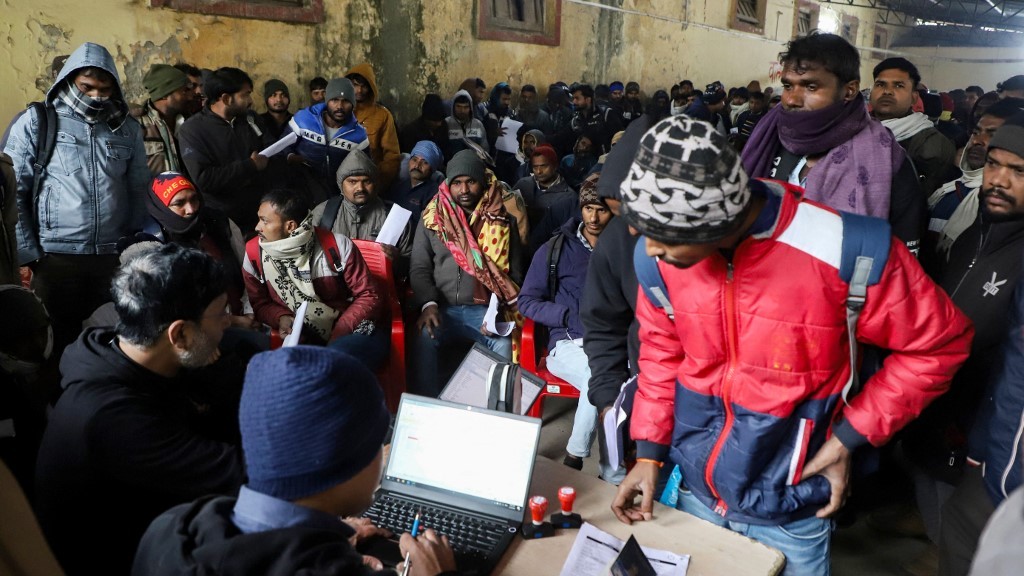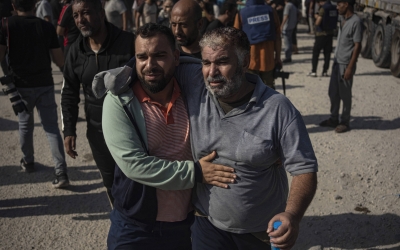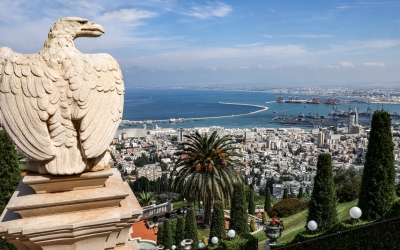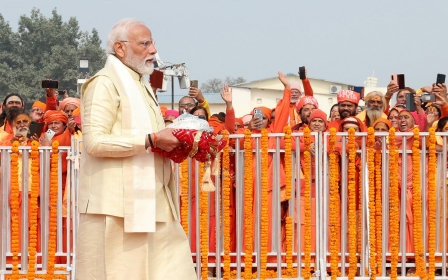'Migration from desperation': Why thousands of Indian workers want to go to Israel
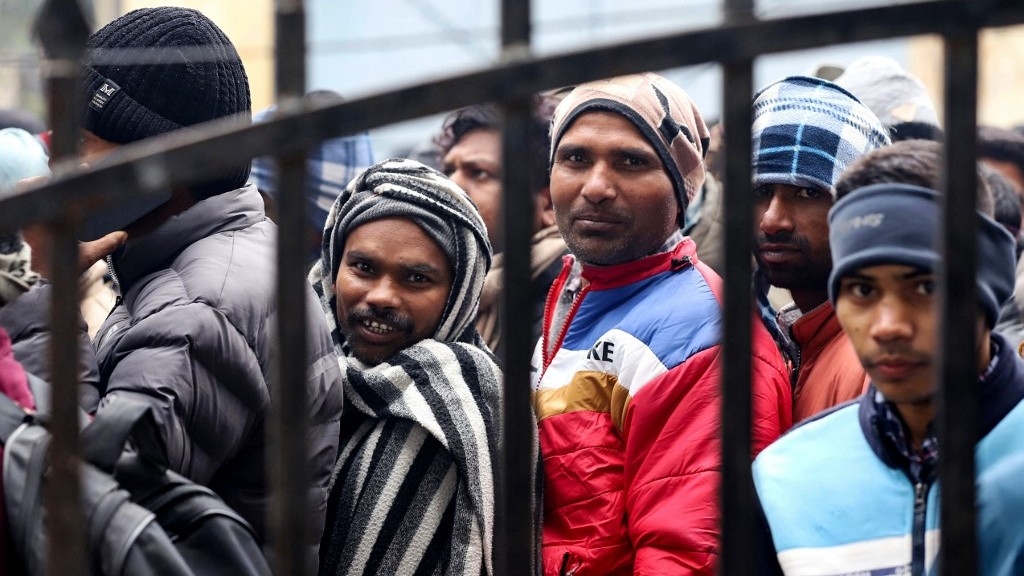
The desperate scenes around India of thousands of labourers queueing up to work in Israel is the surest sign yet that Prime Minister Narendra Modi's much-touted economic policies have failed to meet the needs of his people, economists and trade unionists in India have told Middle East Eye.
New Delhi's decision to encourage and facilitate sending its citizens to Israel as part of a plan to replace Palestinian workers has faced a barrage of criticism, as Israel continues to exercise what experts are calling a genocide in Gaza.
The Israeli government cancelled the work permits of tens of thousands of Palestinian workers from Gaza, following the Hamas-led attacks on Israel on 7 October that sparked the war in Gaza.
The mass revocation of work permits triggered a shortage of low-skilled labour, prompting panic in the Israeli construction sector in particular.
Then, in November, the Israeli Builders Association asked the Israeli government to approach India for workers and said it would require around 50,000-90,000 to replace Palestinian workers. It is estimated that 72,000 Palestinian workers were employed in the construction sector before 7 October.
New MEE newsletter: Jerusalem Dispatch
Sign up to get the latest insights and analysis on Israel-Palestine, alongside Turkey Unpacked and other MEE newsletters
Despite several Indian trade unions coming out firmly against the proposal to send Indians to Israel, in what they say amounts to complicity in the unfolding genocide and ethnic cleansing of Palestinians, the plan went ahead.
In the last week of January in India, recruitment efforts took place in Rohtak in Haryana and Lucknow in Uttar Pradesh, where thousands of Indian workers arrived to be screened and interviewed by Israeli recruitment officials.
The scenes of thousands of unemployed masons, painters, and construction workers queuing up for days outside recruitment centres around the country, in often frigid conditions, is in stark contrast to the messaging of the Indian government on the economy, economists and trade unionists say.
At the World Economic Forum in Davos in late January, the Indian government reported that it was well on its way to becoming the third-biggest economy on earth.
"The scenes at the centres are a direct reflection of the very, very poor condition of workers. That is why they are queuing up to go to Palestine. There's no two ways about it," Pulapre Balakrishnan, a former economist at Ashoka University, outside New Delhi, told MEE.
"It is a migration from desperation. People are being pushed. It is not a pull factor," Balakrishnan said.
Those left behind
Since becoming prime minister of India in 2014, Modi has projected the country's economy and global influence to be on the ascendency.
“At a time when the world is surrounded by many uncertainties, India has emerged as a new ray of hope,” Modi said at the Vibrant Gujarat Global Summit in January.
Economists like Balakrishnan say that India's economy has grown tremendously. This is no myth, but this growth has been neither inclusive nor has it benefited a large chunk of the country. He says the data indicates that real wages for more than 30 percent of the country have not increased since 2014.
Despite projections by the Indian government that the economy is scheduled to become the third-largest in the world by 2027, its inability to absorb as well as provide a living wage to its most vulnerable is leading the country to a precipice.
India's economy grew 7.2 percent in 2022-23, and 8.7 percent in 2021-22. In January, India's finance ministry forecast a growth rate of 7.3 percent for the fiscal year ending in March.
According to Reuters, this is the highest rate for any of the major economies. Yet economists note that India's growth is fuelled by very specific sectors such as the financial services and the information technology sectors, which create limited employment and have a marginal impact on the vast majority of the country.
'I don't fear the war. There is a lot of poverty and lower wages here'
- Amit Kumar Panda, Indian labourer
"We are told that this is a robust economy, but how can it be both robust and unable to provide jobs?" Amarjeet Kaur, general secretary of the All India Congress Trade Union, told MEE.
"The workers want to go to Israel because of high unemployment. There are people dying every day here. This means that the Indian government is failing to provide jobs," Kaur said.
Kaur pointed to the testimony of several workers at recruitment centres.
There's Amit Kumar Panda, 28, a tile mason, who said he travelled 38 hours on a train, covering more than 1,700km from his home state in the eastern state of Odisha, for a job interview in Haryana. Panda told MEE that he knew that Israel was in a state of war but that he needed the work so that his family - his wife, his two children and his mother - might be able to eat.
"I don't fear the war. There is a lot of poverty and lower wages here. We feel the work in Israel is promising," Panda added.
Then there's Dhanraj, 31, a carpenter from Uttar Pradesh, who told MEE he waited in a queue for three days to get an interview. Or Akhil Singh, 21, a blacksmith from Jind city in Haryana, who told MEE that he had to show his skills to an Israeli official during an interview chaperoned by Indian officials.
Balakrishnan said that the fact that so many sign-ups for jobs have taken place in the state of Haryana - considered to have one of the highest per capita incomes in India - is a sign of the extent to which the bottom half of the economy has been left behind.
"This tells you a little about distribution of income. High average incomes are perfectly compatible with the rich having a great deal and the poor having much less," Balakrishnan he said.
While several trade unions, representing collectively tens of millions of Indians, have called upon Delhi not to send Indian workers to Israel lest they become complicit in the unfolding genocide of Palestinians, the Indian government has refused to relent.
'Deceitful and criminal'
Critics like Kaur are concerned, too, that, in an election year, the Indian government as well as the concerned state governments are seeking to portray the opportunities in Israel as a boon created by Indian authorities for the welfare of the people.
The recruitment drive is being led by the Indian government, together with Israel's Population, Immigration and Border Authority, and India's National Skill Development Corporation.
Job seekers are left with no doubt as to whom they are meant to thank for the opportunity.
"In fact, banners at the recruitment sites carry pictures of the prime minister, along with those of local leaders, making it appear that this is employment that the Indian leadership has organised through its efforts,"  the economist CP Chandrasekhar wrote in a recent piece for Frontline.
the economist CP Chandrasekhar wrote in a recent piece for Frontline.
In the coming days and weeks, it is expected that recruitment will spread to at least five other states in India, including Rajasthan, Mizoram, Bihar, Telangana and Himachal Pradesh.
Kaur describes the government's attempt to lure workers, especially without the normal protections promised to Indian migrant labour scheduled to work in conflict zones, as "deceitful and criminal".
"The government is playing politics," Kaur said.
In late January, the All India Central Council of Trade Unions said the government was fast-tracking the recruitment process. In so doing, it was sidestepping the insurance, medical coverage and employment guarantees it would usually provide.
"The central government's decision to send Indian construction workers, nurses and care-givers to a war zone, that too when a genocidal war is being waged by Israel in Gaza, should be opposed tooth and nail," the All India Central Council of Trade Unions said in a statement on 20 January.
"We call upon all workers to reject such 'suicidal projects' that would befall immense hardship and risk to their life!" the unions added.
Rohit Azad, an economics professor at Jawaharlal Nehru University in New Delhi, echoed the notion that the Indian state appears to be outsourcing the responsibility of jobs to others.
"This government is not really delivering on jobs," Azad told MEE. "The state's responsibility is quite critical at the moment, and it is shying away from that responsibility."
According to the Indian government, there are about 18,000 Indians living in Israel. Following the events of 7 October, an estimated 1,309 Indian citizens returned to India.
The plan to deploy workers from India, particularly in the construction and care-giving sector, was originally signed in May 2023, during the Indian prime minister's visit to Israel.
At the time, the two governments signed an agreement to bring 42,000 Indian workers to Israel, with 34,000 for construction and 8,000 in the care-giving sector.
With the revocation of the work permits of 70,000 Palestinian workers and the construction sector entering a standstill, Israel approached India, and later, several other countries.
On 4 February, the Israeli government said it would bring in 65,000 foreign workers from India, Sri Lanka and Uzbekistan.
India-Israel alliance
Under the leadership of Modi and Netanyahu, India has grown considerably closer to Israel. India is the largest purchaser of Israeli weapons, amounting to more than $1bn per year. Between 2015-2019, Indian purchases of Israeli weapons increased by 175 percent.
With the formation of the West Asia bloc in 2022 - involving the United Arab Emirates, the United States, Israel and India - the two countries' economies have sought closer cooperation than ever before.
Indian company Adani now owns the majority stake in the Haifa Port while Indian companies are now co-producing Israeli weapons in factories across India.
This week, the first Heron drone made by Adani-Elbit Advanced Systems India Ltd in Hyderabad was shipped to Israel.
Modi's administration was among the first to condemn the Hamas-led attacks on Israel on 7 October. While the Indian foreign ministry has claimed that its position towards Israel and Palestine has not shifted, it has been slow to join the global call for a ceasefire.
New Delhi abstained from the first vote at the UN General Assembly and signed it only in December.
The Indian government also has not backed South Africa's decision to take Israel to the International Criminal of Justice in The Hague on the accusation of genocide.
Middle East Eye delivers independent and unrivalled coverage and analysis of the Middle East, North Africa and beyond. To learn more about republishing this content and the associated fees, please fill out this form. More about MEE can be found here.


